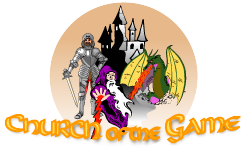Game Dream #10
Mitch Evans has posted Game Dream #10
During games, how do you keep track of the various plot hooks, hints, and people? Are you a master of the arcane memory arts and keep them in your head? Or, are you a mere mortal who must put them to paper? How much notekeeping is too much? Do you find you are more or less organized in game than in real life?As a player I try not to take notes. I have a pretty good memory and I find I remember more than the character generally should anyway.
A few game dreams ago you talked about time travel. I really only take notes to make sure that important continuity is maintained. At times I will have as many as 8 to 10 plot lines going at once. When this happens I usually make a little chart to keep the plot lines synchronized at certain points.
I think that note taking is too much when it starts to interfere with the flow of the game. Players should also take into account the character when they are making notes. A long time ago I posted an article about mapping in games. The idea was that players make flawless maps even if their characters are illiterate oafs. I came up with a scheme that would make mapping more and more difficult for players whose characters are less and less capable of mapping. The same could be said of note taking. I can see a nerdy Mage taking copious notes and cross referencing entries. Even a smart rogue might make notes on poisons or locks, people(potential targets) and traps. A woodsman might make notes on particular plants, animals, monsters, etc. I would draw the line as a GM when a player wanted to take lots of notes for a brain dead thug.
Usually, if the character is such that he should have remembered a meeting or event I will tell him such and give him enough details. If the character is not I will remind them that they have met before, but nothing else. If the character is completely dense I will not only remind the player that the character would not remember any of the previous meeting I will also occasionally change the "facts" from the previous meeting, either subtly or obviously, so the player can not grant the character an unfair advantage.
I am way more organized as a GM than in real life. Although I am working on that, I am starting to use the "Harvard" time tracking system, and I have to admit I am starting to use it in game as well as out of game.






